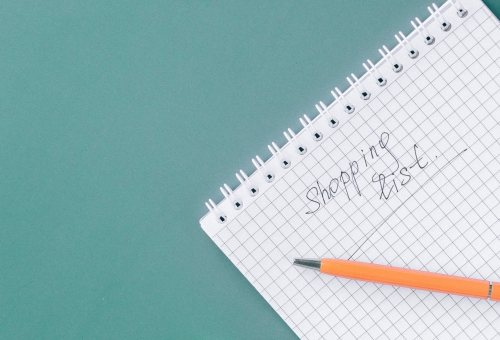While social media sites are great means to get products and services faster, it doesn’t automatically translate to the safest place where you can do your transactions.
The same thing with online shopping apps. While they’re convenient and easy to use, you can fall victim to scams if you’re too lenient.
With these things in mind, we present to you 11 practical tips to help you navigate the budolan that is online shopping.

1.Secure your payment options.
Don’t share it with anyone – even with your closest amigas!
Some reports are going around that scammers tend to connect with the victims’ friends first (usually through social media messengers or SMS) to try and get their trust.
Once they establish trust, they ask for the victims’ money, usually through apps. After receiving the funds, they disappear the same way your former ka-talking stage ghosted you!
Don’t fall prey to this cruel tactic.
2.Keep track of your expenses.
If you’re using a credit card to buy your stuff, check the statement of account (SoA) at least once a week. This especially becomes important as the holiday season approaches.
Regularly tracking and auditing this document will help you detect if there are any fraudulent activities to your name or account.
If you’re more of a debit person, check all the emails and notifications you get once you pay for your orders.
Check that everything has been accounted for and that the seller or app has not charged excessive fees under your account.
Contact your bank or other service providers if you see any signs of account misuse.

3.Keep information to yourself.
While sharing is caring, too much of everything can be harmful – not only to your wallet but also to your online security.
The following are some important details that you should NEVER reveal at all costs when online shopping:
- Your full name
- Answers to your security questions, such as mother’s maiden name, name of first pet, date of birth, and place of birth
- Your account password, or any of your passwords for that matter
- OTPs (one-time passwords) from your payment or banking apps
- Credit card details, especially the CVV (this is the three-digit number that you can see on the back of your card)
4.Use hack-proof passwords.
While your kids’ names and birthdays seem to be great means to remember your access details, don’t go for these.
Instead, keep in mind the following when making a secure password (or two!):
- Use at least one uppercase letter
- Include numbers anywhere within the password
- Insert symbols if the system allows you to do so
Your password can be a favorite phrase or sentence that no one can easily guess. If you want it in another language, that’s a good idea as well!
5.Research…
…the prices, the reviews, the product itself. Anything really that’s relevant to what you want to buy.
As the saying goes, if something’s too good to be true, it most likely is. Do due diligence every single time to avoid running into problems like:
- Receiving wrong items due to neglecting product description
- Waiting for longer periods than expected because the product will come from overseas
- Getting products that do not match the image that the seller presented
While it may take away some of your precious time shopping in Manila, for instance, it can save you more time, energy, and money in the long run.
If peace of mind were a commodity, thorough research is the price to pay.
6.Ask around.
Channel your inner Marites by gathering word about what you tried to research (see tip above).
If you’re using online shopping apps to buy must-haves, check the photos and videos of the items that previous buyers uploaded on the sellers’ website or page. Lurk for a bit and browse through the comments and reviews to get a general feel.
Send a comment or message to some of these buyers and ask more questions about the product if there are no direct reviews concerning the item you’re interested in.
Feeling lazy doing any of these?
Check the ratings of the online store as well as the product itself. Anything lower than 3 (out of 5) stars may be a concern. The same is so for stores and products that have yet to receive reviews.
If most of these things provided negative feedback, it’s time to do a 360 and look elsewhere.

7.Don’t shop outside.
As much as possible, only use trusted devices.
Avoid using public WiFi connections when making and completing transactions. If you’re itching to buy something online (or maybe because there’s a flash sale) but you’re outside, use your mobile data instead to avoid missing out.
It may not be the fastest option, but at least it’s one of the safest ones out there.
8.Don’t get too carried away with promos.
If possible, only go for promos that have been announced beforehand to ensure legitimacy. These usually have accreditations from SEC, DTI, and other similar government entities.
As far as spending money is concerned, don’t go on a buying spree because item A is cute, B is unique, and so on until you reach product Z.
Instead, purchase products that you know you need even before the promos are up. Consumables, such as diapers and toiletries, are good starting choices.
You may even list all the items you need so you will remember to check them come promo day.
Another easy alternative? Addtucart!
When promo day rolls in, just check the discounted price and checkout to your heart’s content.
9.Double check the extra fees.
One of the most common issues that Filipinos complain about when online shopping is the fee on top of the item’s price – shipping fee, to be specific.
In this regard, check the dimensions of the product you wish to buy. The general rule of thumb is the larger the item is, the higher the shipping fee.
If you think the SF is not at par with the product dimensions, contact the seller or the courier and discuss your concern.
10. Resibos are everything.
Take note of the order number, SKU (if there’s one), reference numbers, and other pertinent information. Take screenshots of these as much as possible.
Once you send the seller your payment, screenshot the proof – resibo – that you paid in full.
Whether you’re using an online shopping app or a social media site to complete your transaction, always ask for proof of transactions, such as tracking numbers (for shipped items) and photos of the items before they are sent out to the courier.
11. Trust your gut.
If you want something badly (maybe a highly-coveted KPop merch), it may be easier to ignore the red flags.
While it may be easier said than done at times but use your best judgment to analyze if the seller offers what they say they do.
It takes a lot of patience and EQ to pull this off, but it’s worth it than risking your hard-earned money over something that may not be useful to you in the long run.
During these times when going out is limited, retail therapy can be a great way to cope with stress – if you learn the art of online shopping well. Check this list from time to time so you’ll be reminded of the dos and don’ts every time.




Thank you for sharing this po mommy . Tlga nman very informative and the best tips ito sa lahat ng mga ka budol mommy 😍❤️
These are great tips for anyone shopping online, no matter where you live! I have a few chrome extensions that automatically search for coupon codes for me which has saved me quite a bit!
I love these tips because most of them apply to anyone who online shops anywhere. They’re all important to remember.
These are good tips for shopping online. There are so many ways to get cheated nowadays.
Great tips, these will help people who buy online in Filipine. Sometimes I do trust my gut but I need to make sure.
You have to be so careful with your information. There are so many trying to steal our details in various ways. Passwords should be protected carefully too.
These are some really important and useful tips when it comes to safe shopping online. I use LastPass to manage all my passwords. And of course, don’t forget to track your expenses. I use paper and pen for this.
All good advice. I think the one that many people forget is shopping while using wifi. it is much safer to use your mobile data. There is no reason to take this type of risk.
Ooohhhh…you got all the bases covered here. I love tracking my expenses and recommend it for anyone that shops.
As a certified online shopaholic, these tips are super helpful! Im always making sure that my payments are secure and there aren’t any weird charges on my ccs! Just really have to practice some self control tho!
You should also check the sellers. Probably there are reviews about the sellers so you can decide whether to trust and buy from them.